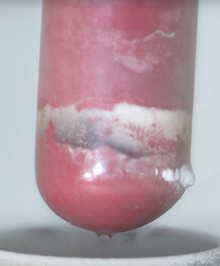|
Tungsten hexachloride
Tungsten hexachloride is an inorganic chemical compound of tungsten and chlorine with the chemical formula WCl6. This dark violet-blue compound exists as volatile crystals under standard conditions. It is an important starting reagent in the preparation of tungsten compounds.[1] Other examples of charge-neutral hexachlorides are rhenium(VI) chloride and molybdenum(VI) chloride. The highly volatile tungsten hexafluoride is also known. As a d0 atom, tungsten hexachloride is diamagnetic. Preparation and structureTungsten hexachloride can be prepared by chlorinating tungsten metal in a sealed tube at 600 °C:[2]
Tungsten hexachloride exists in both blue and red polymorphs, referred to respectively as α and β. The wine-red β can be obtained by rapid cooling, whereas the blue α form is more stable at room temperature. Although these polymorphs are distinctly colored, their molecular structures are very similar. Both polymorphs feature WCl6 molecules that have octahedral geometry, in which all six W–Cl bonds are equivalent, and their length is equal to 224–226 pm. The densities are very similar: 3.68 g/cm3 for α and 3.62 g/cm3 for β. The low-temperature form is slightly more dense, as expected.[3] ReactionsTungsten hexachloride is readily hydrolyzed, even by moist air, giving the orange oxychlorides WOCl4 and WO2Cl2, and subsequently, tungsten trioxide. WCl6 is soluble in carbon disulfide, carbon tetrachloride, and phosphorus oxychloride.[2] Methylation with trimethylaluminium affords hexamethyl tungsten:
Treatment with butyl lithium affords a reagent that is useful for deoxygenation of epoxides.[4] The chloride ligands in WCl6 can be replaced by many anionic ligands including: bromide, thiocyanate, alkoxide, alkyl and aryl). Reduction of WCl6 can be effected with a mixture of tetrachloroethylene and tetraphenylarsonium chloride:[5]
The W(V) hexachloride is a derivative of tungsten(V) chloride. It reacts with arsenic or hydrogen arsenide to form tungsten arsenide.[6][7] Safety considerationsWCl6 is an aggressively corrosive oxidant, and hydrolyzes to release hydrogen chloride. References
|
||||||||||||||||||||||||||||||||||||||||||||||||||||||||||||||||||||||||||||



